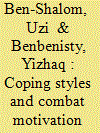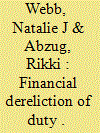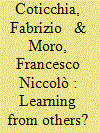|
|
|
Sort Order |
|
|
|
Items / Page
|
|
|
|
|
|
|
| Srl | Item |
| 1 |
ID:
148250


|
|
|
|
|
| Summary/Abstract |
The characteristic challenges of combat lead military personnel to develop adaptive coping styles that are different from coping styles used in routine life. This contention is explored using data collected from Israel Defense Forces conscript and reserve soldiers during intense military operations. The results of this study support this claim, in particular concerning faith. Coping styles were also correlated with combat motivations and measures of positive and negative emotions. It seems that a well-adapted soldier may use unique coping styles that, although perhaps not understood by outsiders, can contribute to his capacity to carry out his undertakings. A better understanding of such a state of mind should prove valuable for military leaders and religious experts.
|
|
|
|
|
|
|
|
|
|
|
|
|
|
|
|
| 2 |
ID:
148253


|
|
|
|
|
| Summary/Abstract |
Charity watchdogs and the media level serious allegations of mismanagement of funds at charities serving former and current members of the U.S. armed services, affecting service recipients, families, donors, grantors, foundations, and taxpayers. To examine these allegations, we use two approaches from the literature to assess nonprofit financial effectiveness: the organization’s ability to gain resources and to sustain activities. We mirror the approach of charity raters, whose measures are widely available to the public. Using GuideStar/Internal Revenue Service data, we compare fund-raising expenditures, assets, and financial sustainability of large national military and veterans nonprofits to a random sample of national nonprofits. We apply propensity score matching and compare organizations similar in size, age, and other factors. We find little difference between military and veterans charities and other nonprofits and provide an improved method for evaluating the financial health of nonprofits across academic discipline, nonprofit field of service, and within or among countries.
|
|
|
|
|
|
|
|
|
|
|
|
|
|
|
|
| 3 |
ID:
148252


|
|
|
|
|
| Summary/Abstract |
How does military change take place in states that are not able to develop autonomous solutions? How does transformation occur when limited resources are available? What are the “sources of military change” for armed forces that do not possess the (cognitive and material) resources that are essential for autonomous development? In articulating an answer to these questions, this article draws from the theoretical debate on interorganizational learning and looks at the mechanisms that drive “learning from others.” We argue that adaptation and organizational learning often had to look for, and then try and adapt, off-the-shelf solutions that required relatively more limited resources. Empirically, the article focuses on the Italian Armed Forces, which have rarely attracted scholarly attention, although it emerged from almost total lack of activity in the Cold War to extended deployments in the 2000s.
|
|
|
|
|
|
|
|
|
|
|
|
|
|
|
|
| 4 |
ID:
148249


|
|
|
|
|
| Summary/Abstract |
Political actors have assumed that economic sanctions hinder a nation’s stability by reducing its economic growth, though history has shown otherwise. One potential explanation for this phenomenon is that any decline in a growth is offset by the economic benefit they receive from a response of increased militarization. Using a defense-driven model, we test this explanation with data Iranian from 1959 to 2007. The findings show that economic sanctions have limited the development of Iran, but the influence of an increasing defense sector offsets the sanctions, suggesting sanctions may be ineffective due to the substitution effect from defense expenditures.
|
|
|
|
|
|
|
|
|
|
|
|
|
|
|
|
| 5 |
ID:
148251


|
|
|
|
|
| Summary/Abstract |
Military establishments view religious soldiers with mixed feelings and must contend with the specific dilemmas these soldiers present. This article suggests what might influence the managing of religious diversity in the ranks, using the idea of dimensions of isolation. The more removed a military is from society, the more likely it is to utilize internal mechanisms when dealing with religious soldiers. The less removed it is from society, the more likely it will be to turn to external mediating mechanisms in this regard. Using three dimensions of isolation (physical, temporal, and psychological), this article discusses the treatment of religious troops in the Israeli and Turkish cases. After exploring what can be learned from these cases regarding the accommodation of religious soldiers, the article concludes with some suggestions for future research.
|
|
|
|
|
|
|
|
|
|
|
|
|
|
|
|
| 6 |
ID:
148254


|
|
|
|
|
| Summary/Abstract |
Cross-cultural competence not only emphasizes building specific skill sets such as language proficiency or negotiation skills, but also on changing the military's attitudes to other cultures by emphasizing the value and importance of cultural skills for successful military operations. In contrast to developing cultural skills, the task of shifting cultural attitudes is a far more complex process. Using empirical data from a survey of 2,406 Marines, this paper seeks to identify some of the social, demographic and experiential factors that influence military service members' attitudes to the value of culture in military operations. The authors found that of the demographic factors tested, only education and commissioning were positively related to attitudes. The greatest predictors were experiential factors: language skills, a multicultural background, travel experience and frequency of interaction with the local population during a previous deployment. Deployment alone was not a predictor. Cultural training was not related to attitudes, although satisfaction with the cultural training was a predictor of positive attitudes.
|
|
|
|
|
|
|
|
|
|
|
|
|
|
|
|
|
|
|
|
|